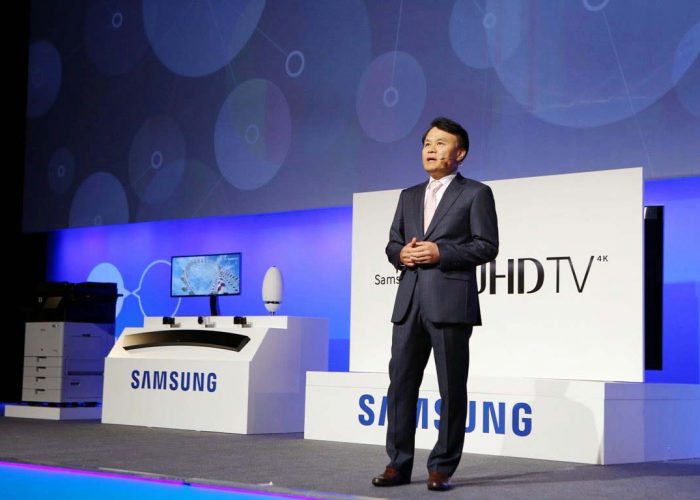



Samsung Affiliates Drop as Regulator Seeks Cut to Holdings
Samsung Group affiliates fell in Seoul after South Korea’s antitrust regulator ordered the nation’s largest conglomerate to cut cross-shareholdings by March or face possible penalties.
Samsung C&T Corp. slumped 4,8 percent, the biggest decline since Sept. 23, and Samsung SDI Co. dropped 3,1 percent. The Fair Trade Commission ruled the chaebol must address a complex web of shareholdings involving its affiliates and C&T, the de facto holding company formed through a deal in September.
The agency’s decision presents one more headache for the conglomerate as it tries to turn around Samsung Electronics Co., which is losing ground in smartphones and facing intense competition in semiconductors. The agency’s push may also increase pressure on the conglomerate to sell stakes in key affiliates, potentially weakening the Lee family’s control.
“It creates an overhang issue,” said Lee Sang Hun, an analyst at HI Investment & Securities Co. in Seoul. “The market is speculating that Samsung SDI may offload C&T shares in a block deal and that is pressing hard on C&T shares today.”
Circular Holdings
After March 1, the Korean technology and industrial giant would be in violation of a 2014 law that prohibits the creation or reinforcement of cross-shareholdings.
One option is to have battery maker Samsung SDI trim its ownership of C&T by selling shares representing a 2.6 percent stake, the commission said in a statement. That would have the effect of unloading additional shares in C&T that it picked up after the merger.
Failing that, the conglomerate’s affiliates must sell down holdings in one another that create “circular shareholdings.” That term refers to a situation where one company owns shares in a second, which in turn has investments that loop back to a holding in the first company.
“We will accept the FTC’s decision in light of resolving the cross shareholdings,” said Bomi Lim, a spokeswoman at Samsung Group. “Due to the latest decision, SDI should sell five million C&T shares by the end of February and we will review ways to minimize the impact on the market as much as we can.”
Controversial Deal
Cheil Industries Inc. bought Samsung C&T in one of the most controversial deals in Korean history, as billionaire activist investor Paul Elliott Singer bought a stake in C&T to try and block the deal. The merger, which helped the Lee family cement control, ultimately went through and the newly formed entity adopted the C&T name.
It also allowed Samsung Group to strengthen its cross-ownership structure since the merged affiliates had stakes in other companies.
Samsung has until March 1 to meet the FTCs request before the regulator considers further action. It singled out Samsung SDI partly because it’s part of three separate loops involving C&T and different affiliates.
South Korea’s government has targeted cross shareholdings, a common practice among major conglomerates including Hyundai Motor Group and Lotte Group that helps families tighten their grip on chaebols with only minority stakes.
Clunky Structures
The structure has been blamed for contributing to South Korea’s financial crisis in the late 1990s and weakening corporate governance by encouraging loans from profitable companies to struggling affiliates.
South Korea bans the creation or reinforcement of circular shareholdings under the 2014 Fair Trade Law, but mergers warrant a temporary exemption. Companies are given a six-month grace period, during which it can address any issues arising from such deals.
Samsung needed to address the fact that the C&T merger strengthened existing circular holdings, the regulator said. For instance, Samsung SDI picked up additional shares in C&T, increasing its ownership of the company.
Follow us on Twitter on @FingazLive and on Facebook – The Financial Gazette